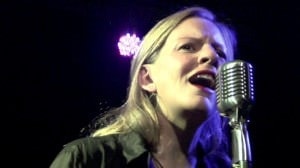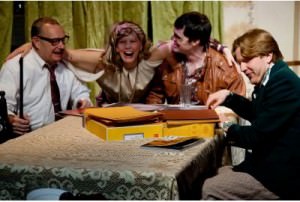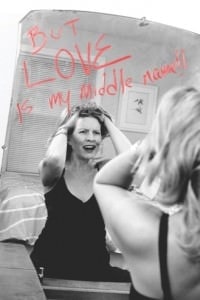Emily Love Morrison is a Washington, DC actor, who most recently performed in American Century Theater’s Little Murders, by Jules Feiffer. She offered her perspective on life as an actor in DC.

Pat: What makes Washington theater exciting?
Emily: It’s very creative. It’s got an integrity and an intellectualism to it that I didn’t find as much in California. And it has an audience, which is so important As far as trends, [local] people are writing, they’re being encouraged to write. Theater J is doing something called Locally Grown, doing the plays of local playwrights. Fringe gives local and national artists an opportunity to try out their skills as writers here. I think that really gives people a creative boost—why don’t I write something? There’s a theater company that won the John Aniello Award for Emerging Theater Company, Factory 449, a theater collective. Just about everything they do is new or experimental. So there is very interesting experimental theater going on here.
What is it like to be an actor in DC, compared to other cities?
People are generally happy for you when you get a role they auditioned for. You really do get a sense of community here. Los Angeles, where I started acting, has an audience for theater, but it’s mostly friends, and you could get your agent to come. So it’s more of a means to a television and film career than it is a serious theatrical pursuit. So that’s wonderful about what [the fact of an audience] means to Washington, because you have some very serious actors here who want to live in Washington. They’re not necessarily looking to move to other places, but they put every bit as much passion and work into their roles. In LA and New York there is the possibility that you might pop out of your theater world and into a television or a film world. There’s a dream that just doesn’t exist here. It’s a different perspective on your life as an actor.

Maybe that enriches theater here?
Probably it does. Actors here are not in transit. They live here, they have children here. They like it here. So they want to contribute to the world here. It’s a task for the city and for its theaters and for its theater community to stand up and be counted and be known in the country as a great theater town. One of the problems is that some of the bigger theaters don’t cast from the local pool. You’re more likely to get a job at Studio theater if you live in New York. I can give you a phone, say I live in New York but really live in Washington and it might increase my chances of getting cast, at those theaters. A local playwright whose play was being done at Arena had a local person she wanted to star in the play, and that local person had to go to New York to audition.
You are a singer/songwriter, playwright, advertising and public relations specialist. You’ve worked as a fashion stylist, as a marketing and licensing professional for Ralph Lauren and Lucky Brand, and as a visual display artist and graphic designer. How do those lines of work—all of them creative – inform your acting?
All of those pieces of work are a reflection of something that I love, whether it’s fashion or music or history, or words, literature. I came to acting later in life, and when I discovered it, I realized that the stage could house all of those passions. So in a play I can bring my music, I can bring my costumes, I can bring my love of language. And early on I studied psychology and that actually has become very helpful in working on the characters.
What has acting given you?
I think what it made me do is know and understand myself in a way that I really never had. The training that I had in California was Stella Adler training. And right away you are made aware of the things you do to dodge, to check out. It calls attention to your tics, in an effort to strip yourself of them so you don’t bring them to every character. And then, every time you have a character you’re challenged with their emotions and what story that character is trying to tell, and inevitably you’re going to learn something from that and you’re going find a piece of yourself in that, no matter how heinous that character might be. You understand that everybody has stuff that they’re dealing with. So I think I really look at people differently. What we see on the outside is nothing compared to what is on the inside.

I had a really good time writing it. I probably enjoyed writing it more than producing it. The mechanics of Fringe and production were kind of tough. It was very cathartic to write it; they were stories I’d been telling for a long time. It was fun to connect the dots and connect the music to it. It was interesting to experience my own emotions as a younger person and keep them fresh.
How did you come to acting?
I was a couple of weeks shy of forty and a friend of mine who had moved to LA in the same year that I had and was taking this class said you’ve got to take this class. It will be great for your songwriting or performing or whatever, maybe you’ll be an actor, but you’ve got to take this class. Within about a month, I had a sort of out-of-body acting experience. And I thought, This is the stage that I’ve been walking towards. That was ten years ago, and there are other stages to walk toward, but at that moment, and right now still, it’s the place I like to go.
Note: This interview originally appeared on Arts America.
Emily Morrison’s website.




